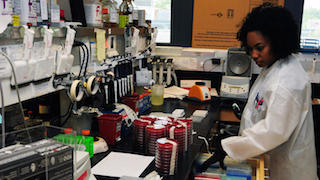penicillin
See the following -
'Big Chicken': The Medical Mystery That Traced Back To Slaughterhouse Workers
Reimert Ravenholt, a physician at the Seattle Department of Public Health, was puzzled. It was the winter of 1956, and for weeks now, local doctors had been calling him, describing blue-collar men coming into their offices with hot, red rashes and swollen boils running up their arms. The men were feverish and in so much pain they had to stay home from work, sometimes for weeks...
- Login to post comments
A 'Slow Catastrophe' Unfolds as the Golden Age of Antibiotics Comes to an End
 In early April, experts at a military lab outside Washington intensified their search for evidence that a dangerous new biological threat had penetrated the nation’s borders. They didn’t have to hunt long before they found it. On May 18, a team working at the Walter Reed Army Institute of Research here had its first look at a sample of the bacterium Escherichia coli, taken from a 49-year-old woman in Pennsylvania. She had a urinary tract infection with a disconcerting knack for surviving the assaults of antibiotic medications. Her sample was one of six from across the country delivered to the lab of microbiologist Patrick McGann...
In early April, experts at a military lab outside Washington intensified their search for evidence that a dangerous new biological threat had penetrated the nation’s borders. They didn’t have to hunt long before they found it. On May 18, a team working at the Walter Reed Army Institute of Research here had its first look at a sample of the bacterium Escherichia coli, taken from a 49-year-old woman in Pennsylvania. She had a urinary tract infection with a disconcerting knack for surviving the assaults of antibiotic medications. Her sample was one of six from across the country delivered to the lab of microbiologist Patrick McGann...
- Login to post comments
Documents Reveal How Poultry Firms Systematically Feed Antibiotics To Flocks
Major U.S. poultry firms are administering antibiotics to their flocks far more pervasively than regulators realize, posing a potential risk to human health. Internal records examined by Reuters reveal that some of the nation’s largest poultry producers routinely feed chickens an array of antibiotics – not just when sickness strikes, but as a standard practice over most of the birds’ lives...
- Login to post comments
How Congress Ignored Science and Fueled Antibiotic Resistance
The study was being conducted by Dr. Stuart B. Levy, a researcher in Boston. Levy was 36 in 1974. He was the son of a family doctor from Delaware and had grown up accompanying his father on house calls and discussing cases afterward. He was a faculty member at Tufts University School of Medicine, in a part of Boston that is gentrified now but was cheap and seedy then, and he had taken a circuitous route to get there, studying first literature, then medicine, and then microbiology in Italy and France...
- Login to post comments
New Arms Race: Science Versus Antibiotic-Resistant Superbugs
 The death rate from bacterial infections plummeted following the discovery of penicillin. However, these microbes developed ways to resist our antibiotics. What threats do superbugs pose and what factors contribute to their emergence? The discovery and development of antibiotics saved millions of lives during the latter half of the 20th century. Scottish bacteriologist Alexander Fleming, who witnessed soldiers with infected wounds perish while serving in the Royal Army Medical Corps during the First World War, per chance discovered a penicillin producing mold in 1928...
The death rate from bacterial infections plummeted following the discovery of penicillin. However, these microbes developed ways to resist our antibiotics. What threats do superbugs pose and what factors contribute to their emergence? The discovery and development of antibiotics saved millions of lives during the latter half of the 20th century. Scottish bacteriologist Alexander Fleming, who witnessed soldiers with infected wounds perish while serving in the Royal Army Medical Corps during the First World War, per chance discovered a penicillin producing mold in 1928...
- Login to post comments
Peer into the Post-Apocalyptic Future of Antimicrobial Resistance
Aout 4 million years ago, a cave was forming in the Delaware Basin of what is now Carlsbad Caverns National Park in New Mexico. From that time on, Lechuguilla Cave remained untouched by humans or animals until its discovery in 1986—an isolated, pristine primeval ecosystem. When the bacteria found on the walls of Lechuguilla were analyzed, many of the microbes were determined not only to have resistance to natural antibiotics like penicillin, but also to synthetic antibiotics that did not exist on earth until the second half of the twentieth century...
- Login to post comments
Peer into the Post-Apocalyptic Future of Antimicrobial Resistance
Aout 4 million years ago, a cave was forming in the Delaware Basin of what is now Carlsbad Caverns National Park in New Mexico. From that time on, Lechuguilla Cave remained untouched by humans or animals until its discovery in 1986—an isolated, pristine primeval ecosystem. When the bacteria found on the walls of Lechuguilla were analyzed, many of the microbes were determined not only to have resistance to natural antibiotics like penicillin, but also to synthetic antibiotics that did not exist on earth until the second half of the twentieth century...
- Login to post comments
The Grim Propect of Antibiotic Resistance
 When people hear about antibiotic resistance creating “superbugs”, they tend to think of new diseases and pandemics spreading out of control. The real threat is less flamboyant, but still serious: existing problems getting worse, sometimes dramatically. Infections acquired in hospital are a prime example. They are already a problem, but with more antibiotic resistance they could become a much worse one. Elective surgery, such as hip replacements, now routine, would come to carry what might be seen as unacceptable risk. So might Caesarean sections. The risks of procedures which suppress the immune system, such as organ transplants and cancer chemotherapies, would increase...
When people hear about antibiotic resistance creating “superbugs”, they tend to think of new diseases and pandemics spreading out of control. The real threat is less flamboyant, but still serious: existing problems getting worse, sometimes dramatically. Infections acquired in hospital are a prime example. They are already a problem, but with more antibiotic resistance they could become a much worse one. Elective surgery, such as hip replacements, now routine, would come to carry what might be seen as unacceptable risk. So might Caesarean sections. The risks of procedures which suppress the immune system, such as organ transplants and cancer chemotherapies, would increase...
- Login to post comments
Three Reasons the US is Not Ready for the Next Pandemic
 One hundred years after the Great Influenza pandemic of 1918, global health leadership stands at a crossroads. The United States continues to expand its policy of isolationism at a time when international cooperation in health could not be more important. The state of pandemic preparedness and the necessary steps for protecting the people throughout the world was the topic of The Scowcroft Institute for International Affairs' 2nd Annual White Paper. As pandemic policy scholars, with two of us spending the majority of our career in the federal government, we believe that it is essential to prepare the country and the world for the next pandemic. It is not a matter of if, but when, the next disease will sweep the world with deadly and costly consequences.
One hundred years after the Great Influenza pandemic of 1918, global health leadership stands at a crossroads. The United States continues to expand its policy of isolationism at a time when international cooperation in health could not be more important. The state of pandemic preparedness and the necessary steps for protecting the people throughout the world was the topic of The Scowcroft Institute for International Affairs' 2nd Annual White Paper. As pandemic policy scholars, with two of us spending the majority of our career in the federal government, we believe that it is essential to prepare the country and the world for the next pandemic. It is not a matter of if, but when, the next disease will sweep the world with deadly and costly consequences.
- Login to post comments
‘Superbug’ Scourge Spreads as U.S. Fails to Track Rising Human Toll
Fifteen years after the U.S. declared drug-resistant infections to be a grave threat, the crisis is only worsening, a Reuters investigation finds, as government agencies remain unwilling or unable to impose reporting requirements on a healthcare industry that often hides the problem...
- Login to post comments